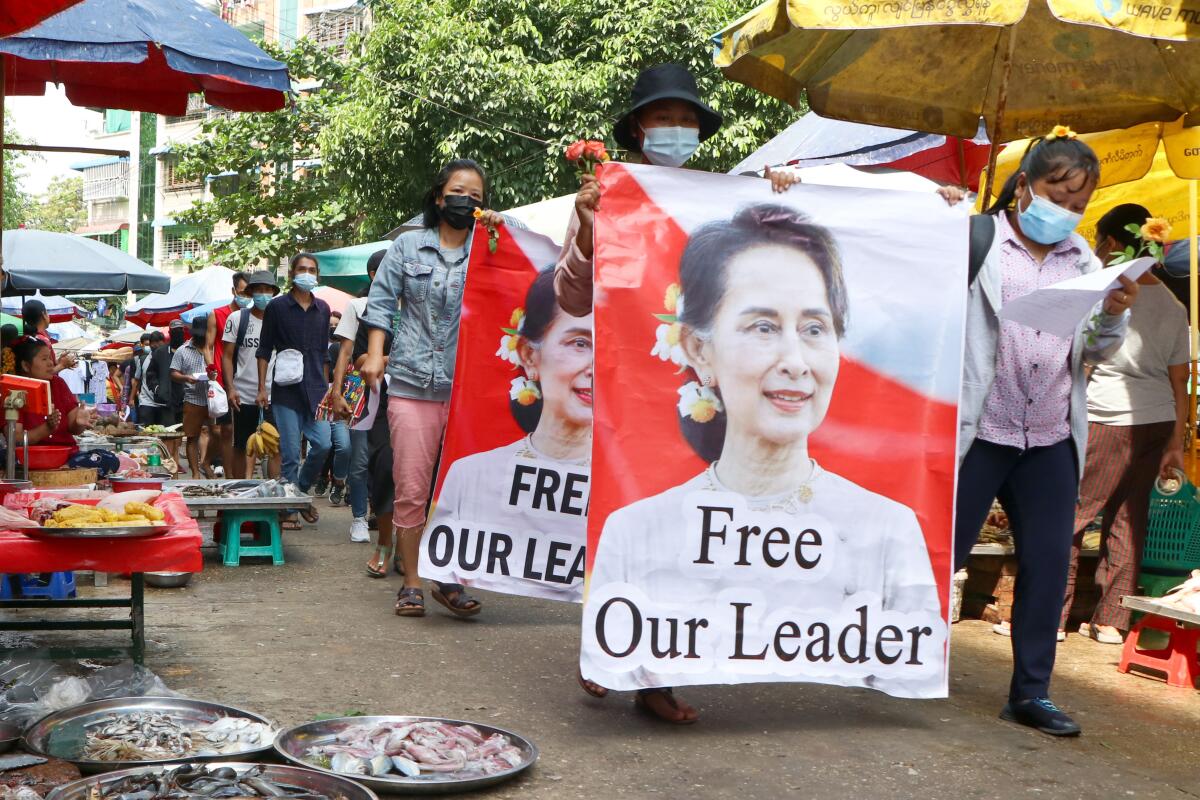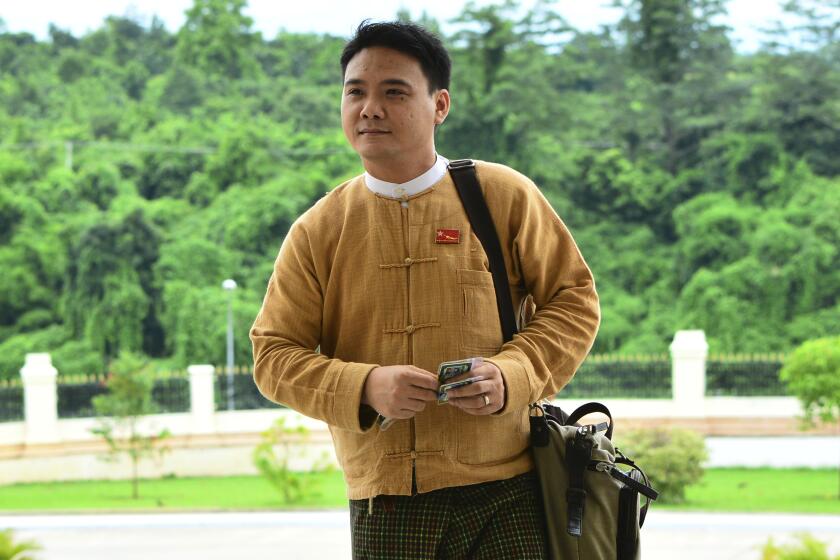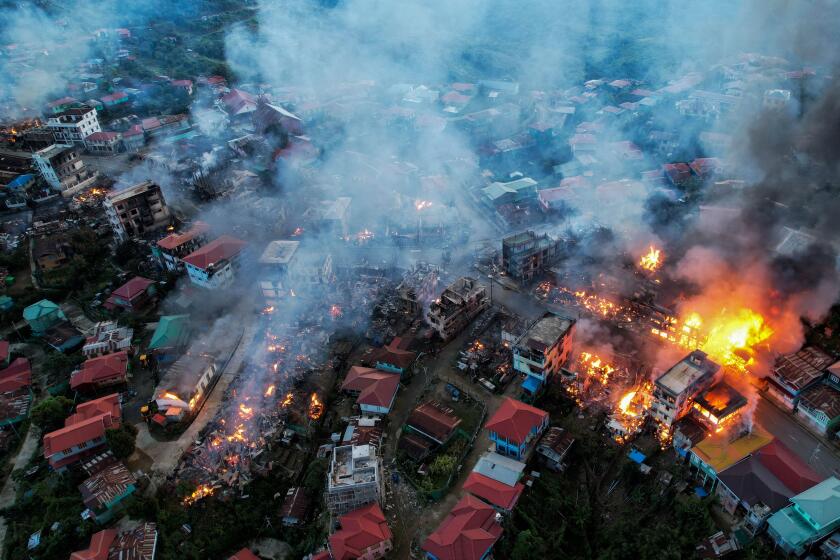Graft convictions increase Aung San Suu Kyi’s prison term to 26 years

- Share via
BANGKOK — A court in military-ruled Myanmar convicted the country’s ousted leader, Aung San Suu Kyi, on two more corruption charges Wednesday, with two three-year sentences to be served concurrently, adding to previous convictions that now leave her with a 26-year total prison term, a legal official said.
Suu Kyi, 77, was detained Feb. 1, 2021, when the military seized power from her elected government. She has denied the allegations against her in this case, in which she was accused of receiving $550,000 in bribes from Maung Weik, a tycoon convicted of drug trafficking.
Corruption cases form the biggest share of the many charges the military has brought against the 1991 Nobel Peace Prize laureate. Suu Kyi has been charged with 12 counts total under the Anti-Corruption Act, with each count punishable by up to 15 years in prison and a fine.
Suu Kyi had already been sentenced to 23 years’ imprisonment after being convicted of illegally importing and possessing walkie-talkies, violating coronavirus restrictions, breaching the country’s official secrets act, sedition, election fraud and five corruption charges.
Her supporters and independent analysts say the charges are a politically motivated attempt to discredit her, legitimize the military’s seizure of power and keep her from taking part in the next election, which the junta has promised in 2023.
In recent months, her trials have been held in a purpose-built courtroom in the main prison on the outskirts of the capital, Naypyitaw. She has not been seen or allowed to speak in public since she was arrested, and her lawyers, who had been a source of information on the proceedings, have not been allowed to speak publicly on her behalf or about her trial since a gag order was placed on them last year.
The executions, detailed in the state-run Mirror Daily newspaper, were carried out despite worldwide pleas for clemency for the four political prisoners.
In the case decided Wednesday, Suu Kyi was accused of receiving a total of $550,000 in 2019 and 2020 from Maung Weik, with separate payments being treated as two offenses.
Maung Weik, a construction magnate, had a close relationship with the army generals in power during a previous military-run government and has headed two main companies during three decades in business: Maung Weik & Family Co., specializing in the trading of metals and agricultural products, and Sae Paing Development, a real estate and construction company.
He was sentenced to 15 years in prison in 2008 for trafficking drugs but was released in 2014 under a semi-democratic transitional government led by former General Thein Sein.
After his release from prison, Maung Weik returned to doing business with former generals and, according to a 2017 report in an online news magazine, became chairman of Mandalay Business Capital City Development, which was involved in urban development work.
The military is lashing out with growing brutality as resistance intensifies. Teenagers are among the latest victims, believed to have been burned alive.
Under Suu Kyi’s government, Maung Weik won a major development project that included the construction of houses, restaurants, hospitals, economic zones, a port and hotel zones in Myanmar’s central Mandalay region.
He was reportedly interrogated by the army two weeks after its takeover last year, and shortly after that, in March 2021, military-controlled state television broadcast a video in which he claimed to have given cash payoffs to government ministers to help his businesses.
He said in his video that the money included $100,000 to Suu Kyi in 2018 for a charitable foundation named after her mother, plus another $450,000 in 2019 and 2020 for purposes he did not specify.
A state-controlled newspaper, the Global New Light of Myanmar, reported in February that Suu Kyi in her position as state counselor — the country’s de facto chief executive — received $550,000 in four installments in 2019-2020 “to facilitate the business activities of a private entrepreneur.”
Start your day right
Sign up for Essential California for the L.A. Times biggest news, features and recommendations in your inbox six days a week.
You may occasionally receive promotional content from the Los Angeles Times.
Suu Kyi’s close colleague, Zaw Myint Maung, who served as a chief minister in the Mandalay region, was separately accused of receiving more than $180,000 from Maung Weik and was convicted of corruption in June.
In separate proceedings, Suu Kyi is still being tried together with the country’s former president, Win Myint, on another five corruption charges in connection with permits granted to a Cabinet minister for the rental and purchase of a helicopter.
Suu Kyi has been the face of the opposition to military rule in Myanmar for more than three decades. The previous military government put her under house arrest in 1989, which continued off and on for 15 of the next 22 years.
Her National League for Democracy party won a landslide victory again in the 2020 election, but its lawmakers were kept from taking their seats in parliament by the army, which also arrested the party’s top leaders.
More to Read
Sign up for Essential California
The most important California stories and recommendations in your inbox every morning.
You may occasionally receive promotional content from the Los Angeles Times.















